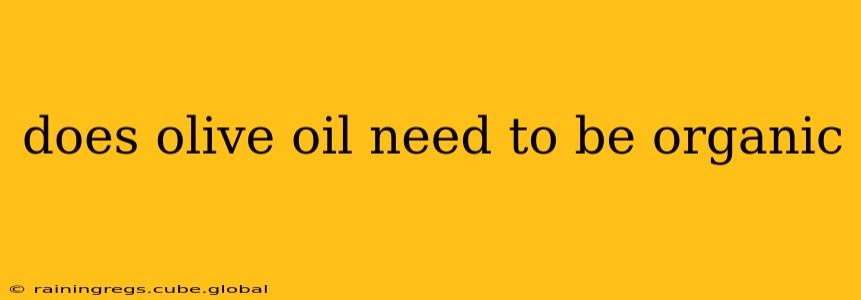The question of whether olive oil needs to be organic is a complex one, sparking debate among health-conscious consumers and culinary enthusiasts alike. While the answer isn't a simple yes or no, understanding the differences between organic and conventionally produced olive oil can help you make an informed choice. This comprehensive guide delves into the nuances of olive oil production, exploring the benefits and drawbacks of choosing organic.
What Makes Olive Oil Organic?
Organic olive oil adheres to strict guidelines established by certifying bodies like the USDA (in the US) or the EU (in Europe). These regulations dictate that throughout the entire production process – from cultivation to processing and packaging – no synthetic pesticides, herbicides, or fertilizers are used. Additionally, olive trees must be grown without genetically modified organisms (GMOs). This commitment to natural farming practices results in a product deemed free from potentially harmful residues.
Are There Health Benefits to Choosing Organic Olive Oil?
This is a frequently debated point. Proponents of organic olive oil argue that its lack of chemical residues results in a healthier product. They suggest that consuming conventionally produced olive oil might expose you to trace amounts of pesticides, potentially impacting long-term health. However, scientific consensus on this is still developing, and more robust research is needed to definitively prove significant health advantages of organic olive oil over conventionally produced oil. The nutritional profiles of both types of olive oil are largely similar in terms of healthy fats, antioxidants, and vitamins.
Is Organic Olive Oil Worth the Extra Cost?
Organic olive oil often commands a higher price tag. This increased cost reflects the greater expense of organic farming practices, including stricter land management and potentially lower yields. Whether the premium is justifiable depends on your individual priorities. If minimizing your exposure to pesticides is paramount, then the extra cost might be worthwhile. However, if your budget is tighter and you prioritize other factors like taste or sourcing, conventionally produced olive oil may be a suitable alternative.
Does Organic Olive Oil Taste Different?
The taste difference between organic and conventionally produced olive oil is subjective. Some individuals claim to perceive a more nuanced, fresher flavor in organic olive oil, while others find no discernible difference. Factors like the olive variety, growing conditions, and processing techniques play a significantly larger role in determining the final taste than the organic certification itself.
How Can I Ensure I’m Buying Quality Olive Oil Regardless of Certification?
Whether buying organic or conventional olive oil, paying attention to quality indicators is crucial. Look for extra virgin olive oil, which indicates minimal processing and superior quality. Check the label for the harvest date and the origin of the olives. A reputable producer will often be transparent about their growing and processing methods. Consider purchasing from local producers or farmers markets if possible to gain more insight into their production practices.
Are there environmental benefits to buying organic olive oil?
Organic farming practices generally aim to protect biodiversity and minimize environmental impact. The absence of synthetic pesticides and fertilizers reduces the risk of water contamination and soil degradation. However, it’s important to note that the overall environmental impact of olive oil production also depends on factors such as water usage, transportation, and packaging. Choosing locally produced olive oil can minimize the carbon footprint associated with transportation.
Conclusion: Making the Right Choice
The decision of whether to buy organic olive oil rests on your personal priorities and budget. While the potential health benefits of organic olive oil are still under research, choosing organic supports sustainable farming practices and minimizes exposure to synthetic chemicals. Ultimately, focusing on sourcing high-quality extra virgin olive oil, regardless of its organic certification, should be your primary concern. By understanding the differences and considering your values, you can make an informed decision that best aligns with your lifestyle and preferences.
